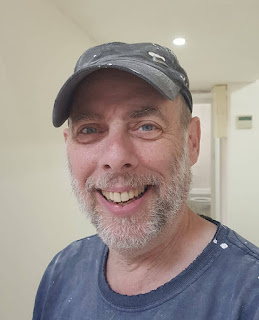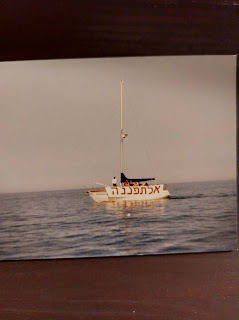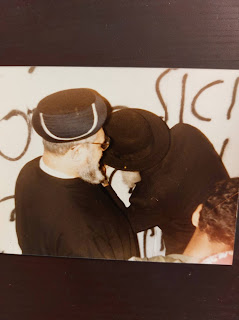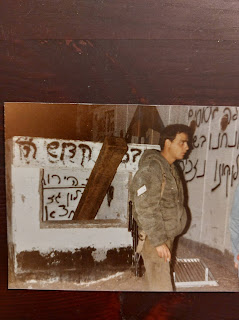Interview with Isser Coopersmith
Yamit was the first expulsion of Jews by Jews in the Jewish State. That is what a lot of people forget when they point to Gush Katif and say that at least now we have proof that the land for peace formula doesn’t work. Gush Katif, it is true, was a massive, outsized event, with 8,600 Jews expelled from their homes, while “only” 2,500 Jews had been forced from their homes in Yamit, 23 years earlier. Expulsion in either case proved traumatic, resulting in spiraling statistics for suicide, divorce, and bankruptcy.
 |
| Isser Coopersmith |
Just as right wing Israelis flocked to Gush Katif to
strengthen the people in the run-up to Disengagement, so too, they came to Yamit
in 1982, ready to fight. One of those who rushed to join the 2,500 Israeli Jews
of Yamit was Isser Coopersmith, an American immigrant to Israel who had settled
in Shilo. He was ready to do anything to help prevent the evacuation.
Coopersmith was 25, and no stranger to showing his loyalty to the Jewish State. After making Aliyah in 1979, Isser helped to build a settlement and a kibbutz, then joined the IDF in 1980, serving in a combat unit. After the evacuation of Yamit, Coopersmith went on to serve in the reserves during the First Lebanon War.
Isser has worn many hats in his professional life: shepherd, goldsmith, chef, house painter. It’s the way of many of us expats. You do whatever is in your capacity to make things work and be part of the project that is Israel, the first Jewish state in the Holy Land. Today, forty years after Yamit, Coopersmith has a 33-year-old son, and is married and living in Maale Adumim.
 |
| Ruti and Isser Coopersmith |
Here is the story of the evacuation of Yamit, as experienced by Isser Coopersmith:
 |
| Coopersmith as a young reservist based on Yamit, 6 months prior to the evacuation. |
Varda Epstein: How did you come to live in Yamit? When did you settle there?
Isser Coopersmith: The year was 1982. I had just finished my army service and there was turmoil in the country because the government was going to return Sinai to the Egyptians and destroy the settlements. Most of the residents took compensation and left. A number of people from around the country organized fishing boats to try and break the naval blockade and reach Yamit. We left in the middle of the night from Michlelet Herzog near Massuot Yitzchak and drove to the Tel Aviv Marina where we set sail on a number of vessels. We were followed and hounded by the navy along the way but reached the shore and descended into Zodiacs and paddled to the beach where hundreds of residents and the army waited. It was like out of a scene from the movie Exodus. We mixed in with the people so the army couldn’t nab us.
 | |
"We rented a fishing boat and 6 or 7 pleasure boats and met at the Tel Aviv Marina, hoping to get into Yamit." |
 | |||
“We labeled one of the boats ‘Al tefanena,’ [“Don’t evacuate
us,” V.E.] which of course is an
allusion to the Altalena.”
|
Varda Epstein: What
was it like, being part of Yamit during that time? Can you describe a typical
day?
Isser Coopersmith: In one way it felt like we were on a holy
mission to keep our land. In another way it felt tense because we knew the
government was going to try and evict us any day. A typical day was eating
sleeping, davening [praying, V.E.], setting up barricades, and going to the
beach.
 |
Bunker in Yamit |
 |
| "Here you see, from right to left, Baruch Marzel, Rav Ariel,
andAvi Farhan, standing outside the bunker. Avi Farhan
was one of the original inhabitants of Yamit, and one of the ones who refused
to leave." |
 |
| "Here you have the chief rabbis, Ovadia Yosef and Shlomo
Goren, trying to talk the Kachnikim [followers of Rabbi Meir Kahane, V.E.] out
of the suicide
bunker. I was guarding the doors of the bunker for a while, so Geula Cohen and my rav [rabbi,
V.E.], Rav Elhanan Bin Nun from Shilo, tried to talk me out of there. "At some point, a reporter from the NY Times asked me a question: Do I have anything to tell the world? "I said, 'Tell Laura I love her,' and I heard people saying, 'Who’s Laura?' "Like, nobody got
it." |
 |
An evacuation soldier outside the bunker. Soldiers attempted to pry open the bunker door with a wooden board, at center |
 |
| The "suicide bunker." The army tried to get in with an acetylene torch. |
 | ||||
"From guarding the bunker I went to a rooftop of a villa, which we barricaded. We put all kinds of like, fencing and things down the staircase, so people couldn’t get to us. I was in the villa with Levi Hazan and Misha Mishkan who tried to self-immolate, which we prevented him from doing. Baruch Marzel was on the second floor, fighting off like ten or 12 soldiers by himself—he weighed like twice as much in those days."
|
 |
"When I was cuffed I kept my wrists facing up so it was wider. When I twisted my wrists together I was able to slip out of the cuffs, opened a window on the bus and escaped to another rooftop. I was arrested again. They sent us to Kela Ashkelon [Ashkelon Prison, V.E.]. I managed to escape from the bus the first time, but they caught me again. Other people, there were some famous people who went to Kela Ashkelon, but because they were famous, they got out early. Benny Katsover and Hanan Porat and Rav Kahane, but we were stuck in jail for a few days." |
Varda Epstein: What was the demographic makeup of Yamit? What was the flavor of the neighborhood? Did you feel comfortable with the people you met there?
Isser Coopersmith: By the time I settled in, most of the
people were Dati Leumi [National Religious, V.E.]. There were lots of settlers
from other settlements and also yeshiva boys. We gave each other strength.
Varda Epstein: Can
you tell us about some of the hardships you experienced while on Yamit during
the evacuation?
Isser Coopersmith: Well, as a single guy I relied on the families
for food. We slept in vacated apartments. All the municipal systems were turned
off. Water wasn’t flowing to the local flora of the city.
Varda Epstein: What
is your best memory of Yamit?
Isser Coopersmith: The camaraderie of the people, the
natural beauty of the area.
 |
Typical street scene, Yamit |
Varda Epstein: Most
of the Gush Katif settlers refused to believe the expulsion would happen. They
didn’t pack or otherwise plan for the eventuality. They believed until the end
that a miracle would happen and that they could stay. How was the purge of
Yamit similar to and how did it differ from the banishment of the residents of Gush
Katif?
Isser Coopersmith: Well, we
didn’t believe it would happen. When it did, we thought it would be so painful
that the government wouldn’t ever do it again. Of course, the people in power
have no heart.
Varda Epstein: Did
you do anything to fight against being evicted from Yamit?
Isser Coopersmith: We set up barricades, stocked up on food,
and fought the soldiers who came to take us.
Varda Epstein: Where
did you go after Yamit? What was your emotional state? How long did it take for
you to get back to normal?
Isser Coopersmith: I returned to Shilo. I was emotionally
depressed, but two months later I was called up for the war in Lebanon so I had
to readjust to the new situation.
Varda Epstein:
Looking back, is there anything anyone could have done to stop the evacuation
of Yamit? What would you personally have done differently? Conversely, what are
you most proud of in relation to your part in the Yamit story?
Isser Coopersmith: I doubt there is anything we could have
done to prevent the destruction of Yamit. Maybe if tens of thousands of people had
joined us, the army wouldn’t have had the manpower to make it happen. I was
proud that I made a stand for my beliefs.
Varda Epstein: What
can we learn from Yamit?
Isser Coopersmith: Never trust the government.
|
Or order from your favorite bookseller, using ISBN 9798985708424. Read all about it here! |

|






























